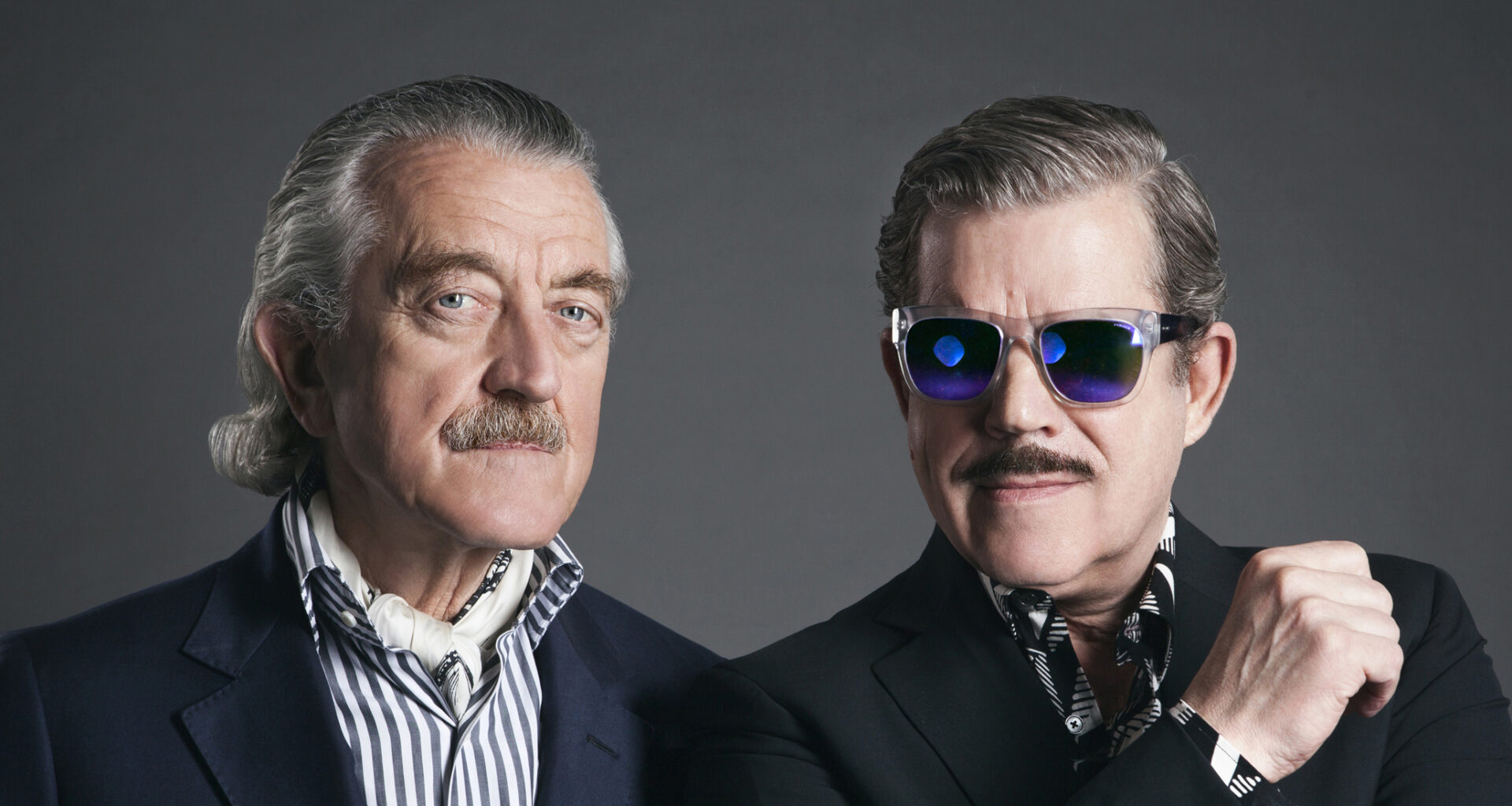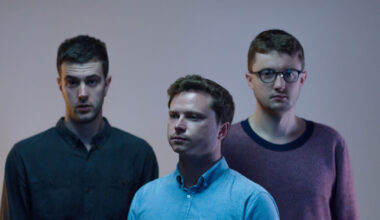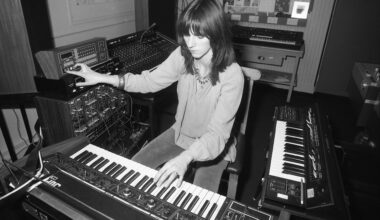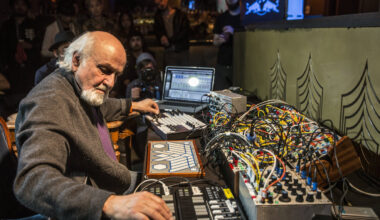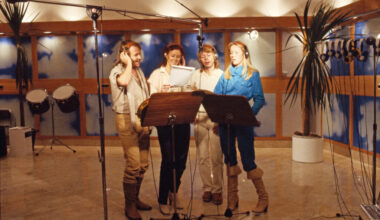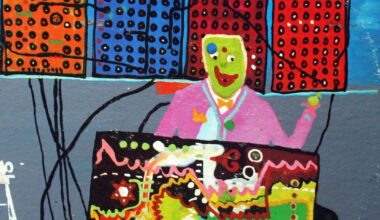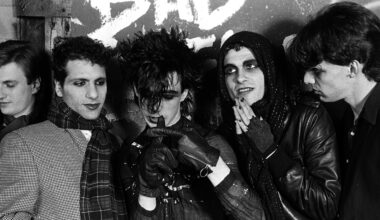Gypsy fortune tellers, chocolate factories, gambling habits, Japanese plate-jugglers, watching trees grow… all in a day’s work when interviewing Yello’s Boris Blank and Dieter Meier as they prepare to release their first albumin seven years and play their first live shows ever
Fifty years ago, future Yello singer Dieter Meier visited a funfair in England. There, in return for £10, an Irish fortune-teller forecast a very long life for the debonair young dilettante who would later become the dapper don of disco Dadaism.
“Looking at my hand, he said he had never seen anything like this,” Meier recalls. “His name was Prince Gypsy Lee and he predicted that I was going to live to be 127 years old. And I believed him.”
This is how interviews go with Switzerland’s most eccentric art-pop elder statesman. A sprightly 71 years young, Meier has a lifetime of stories to share, all of them incredible, most of them true. A one-time professional gambler, punk provocateur, conceptual artist, cattle rancher, globe-trotting tycoon and Jimmy Hill lookalike, the Yello singer is the last of the famous international playboys. Suave and urbane, with just a hint of subversive mischief, Meier may even be the Willy Wonka of Swisstronica. He owns a chocolate factory after all. Yes, for real.
Meier and his younger Yello collaborator, 64-year-old Boris Blank, are about to release their 13th studio album, ‘Toy’. It’s a real beauty, full of deluxe glitch-pop, rubberised twang-funk and fondant electro-soul chansons. Imagine Leonard Cohen sharing a studio with Pet Shop Boys, Massive Attack and Daft Punk. The album’s title, Meier explains, reflects Yello’s perennially childlike love of music as a sonic adventure playground.
“Our studio has always been our toy since we first started to make music,” he explains. “Boris really is like a child with his sound toys around him. The studio is what he likes most in life, diving into his deepest feelings for sounds and music.”
Yello’s musical driving force, Blank typically works on dozens of tracks simultaneously, sometimes for years on end. Meier only joins the process in its final stages, providing lyrics and vocal melodies as well as directing the band’s strikingly surreal videos. In the seven years since their last joint album, ‘Touch Yello’, Blank has been busy putting together his career-spanning retrospective ‘Electrified’ and his collaborative album with the Malawi-born jazz singer Malia, ‘Convergence’, both released in 2014. Malia’s voice, breathy and sensual, also appears on ‘Toy’. Blank has also been occupied with launching his Yellofier mobile app, developed in collaboration with Swedish programmer Jonatan Liljedahl, which allows users to sample everyday sounds, then instantly mix them into a Yello-style sound collage.
“The idea is, for less than the price of a cup of tea, you have a pocket studio which you can record whatever you want,” he says. “You can use all kinds of noises, even ugly noises, to make a whole little symphony.”
Musician friends including Carl Craig, Trentemøller, The Orb, Henrik Schwarz and Booka Shade have all contributed tracks to the Yellofier app. According to Blank, two schools in California are already using it as an educational tool. During our chat, he samples my voice and plays it back to me as an instant techno-pop remix. I have been Yello-fied. He also plays me the yodelling ringtone he uses to embarrass his teenage daughter when they are out in public. Swiss humour.
Yello are launching ‘Toy’ with their first ever live shows, four “operatic” performances at the Kraftwerk Berlin, in October. The pair have always resisted playing live before, partly because Blank dislikes the stilted, pre-programmed format of most electronic shows. So why now? Meier says he changed his mind after touring with the acoustic group Out Of Chaos, while Blank picked up the performance bug during live Yellofier demonstrations. Years of gentle persuasion from their long-time British collaborator and co-producer Ian Tregoning also played its part. Plus the need to promote a new album after seven years away, of course.
Staged inside the same disused power station complex where the Tresor club now resides, the Berlin shows will be as live as possible, Blank promises, with guest singers and players joining Yello on stage.
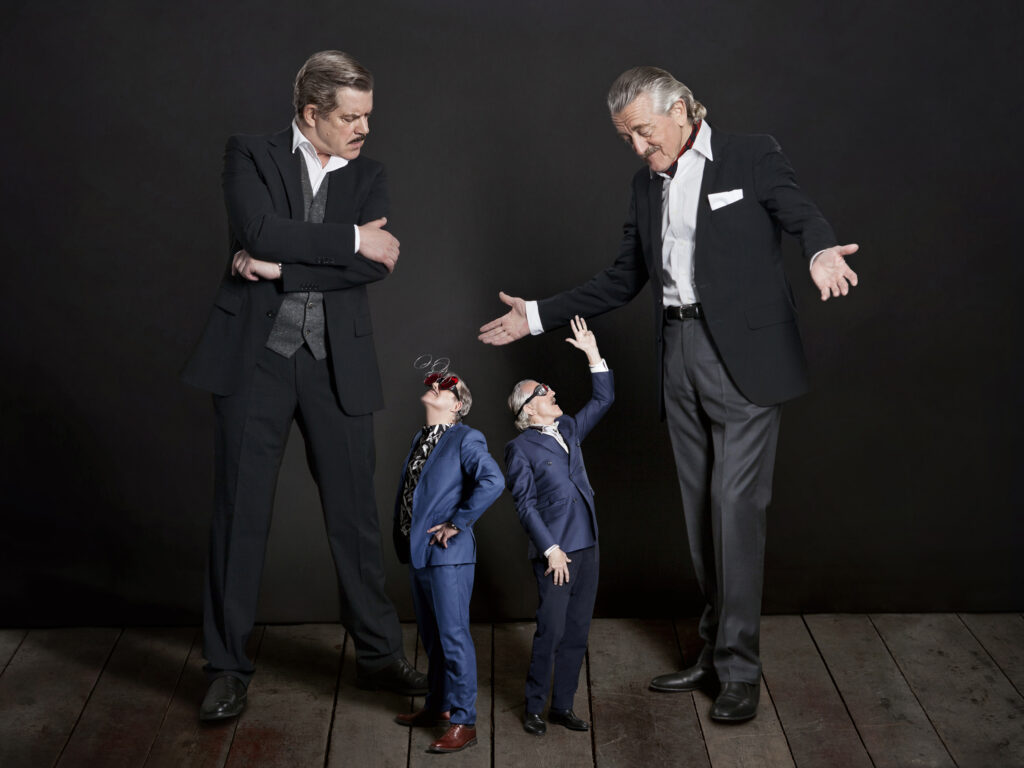
“We are also working with a lot of visuals and light installations,” he says. “Yello live on a rock and roll stage, like a heavy metal band, wouldn’t be our business, which is why we are using the whole building like a theatre. The building is part of the show.”
The Berlin shows are a tentative first step towards a world tour. Yello are already fielding offers from more than 80 promoters.
“I’m very confident that if it does work out, we will go on a tour,” nods Meier. “We already had quite good interest from international bookers, some very important ones.”
The venue for the Berlin shows is a neat coincidence. “Kraftwerk” simply means “power station” in German, of course, but Yello are sometimes lazily tagged as Swiss cousins of Kraftwerk, their fellow founding fathers of Germanic techno-pop. Neither Meier nor Blank seem convinced by the comparison.
“For me the only parallel is that we both use electricity to make music,” says Blank. “Kraftwerk started with being robots, being their own instruments, and I was the opposite. I always wanted to make music with soul, even with a synthesiser, because it was built by human beings. At the time I was not a big fan of Kraftwerk, but now I think they have a genius concept, something unique that just exists once on this planet. Yello was always going different ways. I am using synthesisers as well, of course, but I was always more interested in sampling technology.”
“I like Kraftwerk a lot,” Meier confirms, “but Yello is really a chaos of sounds, it has nothing to do with the minimalism of Kraftwerk. It’s more like an overloaded jungle of ideas and sounds. If you want to compare it with painting, Kraftwerk is more like Mondrian, and Boris is more like Jackson Pollock.”
Most electronic artists, Kraftwerk included, prefer to present themselves as faceless technicians. By contrast, Yello have always embraced their image as flamboyant showmen. Like a René Magritte canvas come to life, they are a living artwork, clown princes of arty eccentronica. But Meier argues Yello’s colourful public face is not a calculated pose, simply a distillation of their true selves.
“This we cannot change,” he shrugs. “Other people are like musical chameleons, like David Bowie. He changed his outfit, his attitude, his style many times, which I think is interesting by the way, I am not criticising. But we cannot do this. Our music was never a speculation or an artificial project.”
The key to understanding Yello, says Meier, is their “self-ironical” humour and Swiss outsider attitude.
“There is no Swiss tradition in rock or pop music,” he offers. “Of course we had lots of rock bands, but it’s always imported, it had no real roots in Swiss cultural tradition. Every Swiss artist creates their own tradition.
They are like flowers somewhere growing high up in the Alps, and you have never seen anything similar.
Famous Swiss writers and artists are always unique plants that can only grow in Switzerland. Boris’ jungle in the mountains is a unique Swiss thing because he had to create his own roots, his own climate. This is typically Swiss.”
The odd couple behind Yello come from very different backgrounds. According to the singer, Blank grew up so poor that he initially had to use his mother’s kitchen implements as makeshift instruments. He worked as a truck driver before forming the band in the late 1970s, initially as an experimental duo with fellow tape artist Carlos Peron, then a more pop-friendly trio with Meier providing vocals and lyrics. Meier, by contrast, was a millionaire even before he joined Yello. Born to a banker father who worked his way up from extreme poverty to great riches, the singer has never concealed his wealthy family connections, but nor does he romanticise them.
“People think if you come from a wealthy background things are easier, and this is not really true,” he says. “I would be lying if I did not admit this, but from when I was maybe 12 or 13, I knew that if I did not want to do anything I did not have to. But if you do not have to do anything to survive, you are a very strange part of society, because late capitalist society is all about work and making a living. Even if you are an artist, you have to focus on making money.”
Meier’s novel solution to his acute case of affluenza was first to become a junior golf champion for the Swiss national team, then a professional gambler. This obsessive lifestyle, he says, gave him some much-needed focus and discipline.
“When you are sitting at a poker table, you are like a boxer in the boxing ring, you are busy surviving,” he explains. “Every three or four minutes you get a new hand of cards, and what you do with it, that is your fate. All the questions about what you should be doing in the world are non-existent. It’s basically like when you become a junkie. This reflects how desperate I was to create a sense for myself. I was a lost child.”
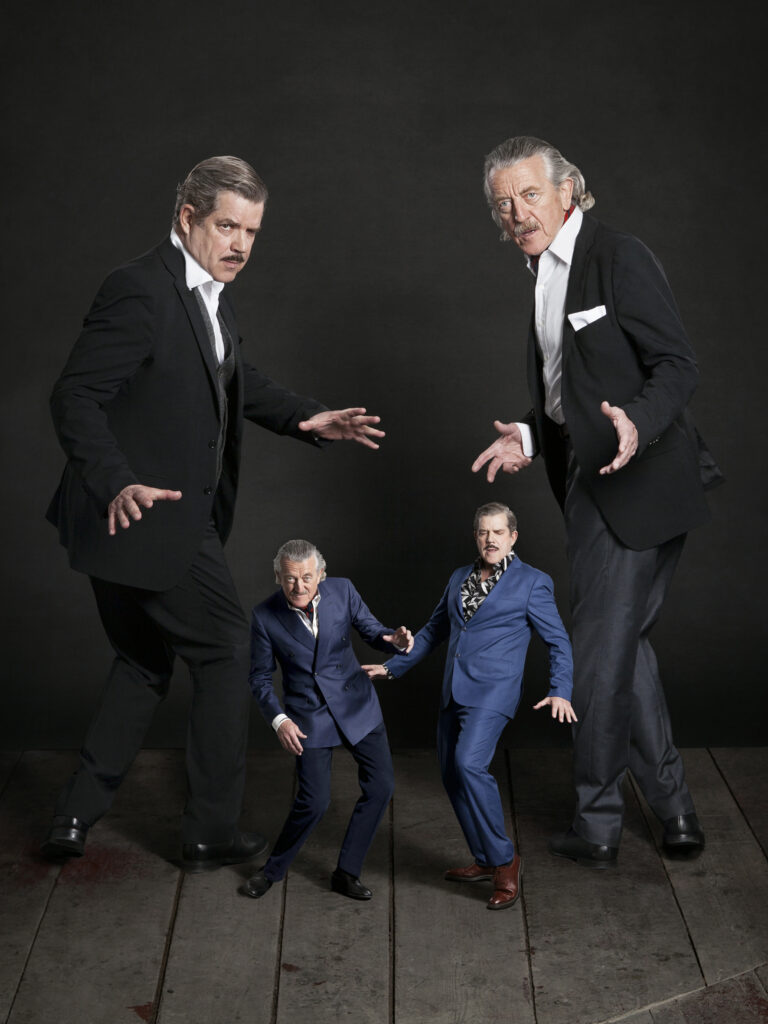
Before Yello, Meier’s occasional musical performances were raw, provocative punk statements, sometimes improvised over a one-string guitar. Meanwhile, Blank was developing Yello’s future sound using cut-up magnetic tape, then splicing together random samples into rhythmic loops. The band’s use of sonic collages, absurdist humour and wordless vocal jabbering reach right back to the Dadaist “anti-art” movement of the early 20th century, which has strong roots in their native city of Zürich, home of the fabled Cabaret Voltaire.
Blank and Meier concede the Dada connection, but insist their motives are much more straightforward.
“I think Dada was a bit more a statement, a concept to be different, a much more academic process than Yello,” Blank argues. “I’m doing music a little bit like a dilettante, because I’m really not a musician. I try to bring together sounds like a patchwork, I try all different colours of sounds, but not on purpose.”
Meier claims Blank is more like a naive folk artist than a Dadaist rebel.
“The Dadaists basically wanted, in a very humorous way, to ridicule art tradition,” he explains.
“They made radical new statements ridiculing the so-called important and classical development of art, the whole bourgeois aspect of art. With Yello, we had a similar approach to creating something new when we started. Rightly, Boris is considered one of the godfathers of techno because he sampled with tape loops and collected sounds that were the basis of his music. But it was not a comment on existing music. He just did this because there was nothing else he could do.”
Dadaists or not, Yello have always had an avant-garde streak, thanks largely to Meier’s early years as a conceptual artist and experimental filmmaker. In 1972, he installed a plaque at the train station at the German city of Kassel with the inscription, “On March 23 1994, from 3 to 4 pm, Dieter Meier will stand on this plaque”. He duly turned up 22 years later. In another art performance, he had 100,000 small metal components delivered to a public square in Zurich, then spent five days counting them into bags of 1,000.
“There was no justification for this, only because I wanted to do it,” Meier shrugs. “It was as unimportant as myself on this planet, but it is a kind of a guideline for whatever I do. My approach to singing is pretty much the same.”
In 1983, shortly before the band hit their commercial peak, Yello became a two-piece when Carlos Perón quit to pursue a solo career. In 1986, ‘Oh Yeah’ featured on the soundtrack to ‘Ferris Bueller’s Day Off’, a lucrative boost to their US profile. Two years later, they scored a UK Top 10 hit with ‘The Race’, which featured Meier rapping in his signature high-velocity Crazy Frog mode. This imperial phase also produced Yello’s sumptuous collaborative single ‘The Rhythm Divine’, recorded with both Shirley Bassey and with the song’s co-writer, The Associates’ late, great singer Billy Mackenzie.
“Billy was always easy to work with because he always worked so fast,” Blank recalls. “He would say: ‘Boris, Boris! Fast, fast! Next, next!’. He always wanted to do something new, he rarely talked about the Associates. It was really great to work with Billy, you never had to fight over anything. It was a very harmonious working process.”
After working together for four decades, Meier and Blank also have a harmonious relationship. But it was not always mellow Yello.
“In the beginning, Boris was not happy at all with my approach to performance,” says Meier. “He is a total perfectionist. He expects his session musicians and even the singer to come with perfection from the beginning. But I am working more like a Zen Buddhist calligraphist, it depends on the moment of doing things.
In the sense of Spanish flamenco, I am looking for the duende, when you are one with what you are doing emotionally. In the beginning Boris expected me to be like a singing machine, but this is not what I will and I can do. This is where we had arguments.”
The solution the bickering duo finally worked out was for Blank to leave Meier alone in the studio for hours to work up his “alchemical” lyrics and melodies from nowhere.
“For many years, maybe 25 or 30 years, this is how we work,” says Meier, “and since then we have very few arguments.”
Throughout his time in Yello, Meier has continued to build a global business empire that now includes a cattle ranch in Argentina, a restaurant in Zürich, an upmarket watch company and several organic vineyards. His latest pet project is a Swiss chocolate factory that uses a radical new method, cold-pressing the cacao bean to preserve the natural aromas and flavours that are usually lost in production. With typical understatement, he says his “chocolate revolution” will shake up the industry when it launches later this year.
The founding father of Willy Wonka-tronica has also directed feature films, most recently ‘Lightmaker’ in 2001, a phantasmagorical fairytale about a magical violin. Blighted by technical problems and a long-running lawsuit, this cult oddity never received a proper release.
“I am still very proud of that film, it was like a damaged kid for me,” Meier sighs. “Filmmaking is probably my biggest passion out of everything. If I had to make a decision, if I could do only one thing on this planet, I would probably want to make movies.”
Can Yello go on forever? Embarking on your first world tour at 71 may seem like an eccentric career choice, but this is Yelloworld. They write their own rules. Even outside his musical commitments, Meier maintains an insanely busy lifestyle, jetting between his six houses and the various business ventures in Switzerland, Berlin, California and Argentina. He remains a fanatical golfer, is writing a novel, and has just completed his first children’s book.
“Sometimes when I wake up in the morning, I go through all the things in my head that I am doing in parallel, and I say: ‘Dieter, you are a total nutcase, you should stop this!’,” he laughs. “I feel like a Japanese plate-juggler, but I’m going to be dead for millions of years, billions of years. So I am going to enjoy this very short time of being alive.”
Blank prefers a gentler pace of life nowadays. A self-styled “nature freak”, he gets his main creative inspiration from fresh air, flowers and woodland rambles with the family dog.
“I need the quietness,” he explains. “I need to see trees growing rather than going out in clubs every night. I did this when I was younger, but today I am a big fan of the nature.”
Yello’s musical driving force admits he may want to swap pop music for more sedate alternatives in the future, possibly film soundtracks. But he remains as obsessed with excavating new electronic noises as he was when he first began slicing up magnetic tapes four decades ago.
“There are so many sounds on this planet that you can get better and better with the new sampling technology,” Blank nods. “Like a scientist, you can go closer to a certain sound, deep in the molecular structure of the surface of the material. You can change even the DNA of a sound and build something almost completely different. This is what still fascinates me in working with sampling and glitching.”
Meier likes to joke that, even at his own funeral, Blank will somehow sample the sound of the coffin nails and turn them into a Yello track.
“For Boris, making music is like breathing,” he explains. “It’s as important a part of his life as breathing. And for me to be invited into the sound paintings of Boris Blank, to give my little contributions, this is such a joy for me. As long as I can sit in a studio and somehow use my voice, I will enjoy doing this even when I am 127 years old. Yello is not a project. Yello is a way of life.”
‘Toy’ is released by Universal
